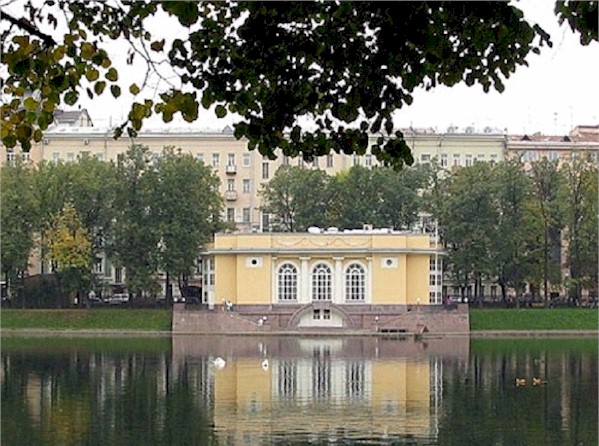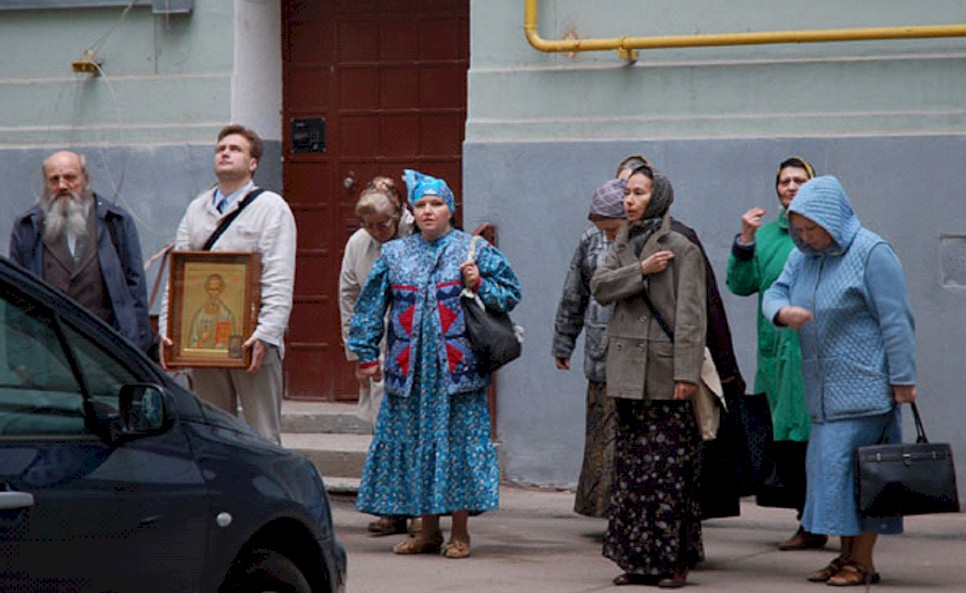Мы продолжаем напряженно работать, чтобы улучшить наш сайт и перевести его на другие языки. Русская версия этой страницы еще не совсем готова. Поэтому мы представляем здесь пока английскую версию. Мы благодарим вас за понимание.
Оппоненты романа
The work of Bulgakov, and certainly The Master and Margarita, has not only followers, but also fanatic opponents. One could understand the resistance against the plans of a monument at Patriarch's Ponds in 2006. The dimensions of the planned sculpture group would completely destroy the idyllic character of the park and the commercial mall which was planned would mobilise opponents in any city in the world. The park is in itself a monument, and the restoration of the environment would be a more significant tribute to Bulgakov than megalomaniac new constructions. But the vandalism which the Bulgakov house underwent on December 22, 2006 can hardly be justified by a «concern for the cultural heritage». It had religious motives, if we may believe the perpetrators. However, Bulgakov can certainly not be accused of anti-religious statements. On the contrary, he was highly offendend by the iconoclastic poetry of the militant atheist Demyan Bedny, and if you read The Master and Margarita with an open mind you can see that Bulgakov lamented atheism. It is even possible that his first sketches for the novel originated as a response to the fierce anti-religious propaganda.

One of the most striking fanatical opponents was, without any doubt, Aleksandr Aleksandrovich Morozov. This eccentric organised most of the demonstrations against the work of Bulgakov and he did not even deny that he destroyed the Bulgakov House's archives on December 22, 2006, together with some followers. Morozov calls himself «the most important guard of the cultural inheritance in Russia» and the «chairman of the Foundation for the salvation of the mo-nument for history and culture, the House of Bulgakov».
In all news items about this act of vadalism, and in the comments on the demonstrations, you will regularly hear that Morozov lived in the apartment building on Bolshaya Sadovaya number 10. But that's only partly true. Morozov didn't live there, he was only registered at this address. His real residence was at Соколиная Гора [Sokolynaya Gora] or the Falcon Hill, a ward in the eastern part of Moscow, at some 9 kilometers from Bolshaya Sadovaya. Nobody knows how he managed to do it, but with his so-called Public regional welfare foundation for the salvation of the House of Bulgakov, this former alcoholic policeman succeeded in obtaining first apartment number 35, and later apartment number 6 of the building at Bolshaya Sadovaya number 10.
When the Soviet Union collapsed, Morozov still lived in his native town Zagorsk, where he started a New School for the Revival of Traditions for Russian Business People. With this vehicle he gathered teenagers from 9 to 12 years old around him. They came from not so successful families of which the parents were glad to have one thing less to worry about. According to some sources he would have made these children working for him as a modern Fagin. A former pupil of Morozov testified that there were 4 groups of 5 children in the school, and the eldest of each group was allowed to speak to the Teacher. The children went along well with each other, they had enough food, but they were all scared to go to the Teacher. They had to “do anything he desired”. At least one of the children had to undergo a treatment of two years after its stay in Morozov's school before it could talk about its experiences there. It never came to a lawsuit, Morozov closed his school and moved to the capital.
In Moscow Morozov's focus changed from pedagogics to business life. The reorganisations in the eighties and the democratization of the nineties were an ideal breading ground for speculators, and Morozov concentrated on the «bad apartments» of Bolshaya Sadovaya number 10. Rather than children he now started to collect flats in bad repair. Theoretically it was to preserve them for falling into disrepair, but nothing happened to do this. He grew a beard and with his oratorical talents, and appealing to the christian orthodox principles, he succeeded in inspiring confidence of some retired cotenants. They willingly welcomed someone who claimed to be able to save the traditional Russian culture from greedy investors and they were prepared to demonstrate against the godless followers of The Master and Margarita. Surprisingly enough, the Saviour himself never participated to the demonstrations of the babushkas. He observed what happened from the other side of the street and preferred to stay in the shadows.

The babushka's at the Bulgakov House
But Morozov participated actively to the vandalism in apartment number 51 on December 22, 2006. He was identified as the leader of the gang but this could not put him off balance. In a discussion on the radio station Эхо Москвы [Ekho Moskvy] or The Moscow Echo on December 26, 2006, he justified his raid by saying that the apartment was uninhabited, and that he had discovered pornography and stolen goods.
Afterwards an official investigation was started against Alexander Morozov. The city's Управление по борьбе с экономическими преступлениями [Upravleniye po borbe s ekonomicheskimi prestupleniyami] or Directorate for the Fight of Economical crimes started an investigation on him. And the department for Housing of the city of Moscow decided to expel the Saviour of the inheritance from his apartments. Morozov said he was not at all impressed. He started singing in the choir of the Taganka church and was not afraid that his former activities with the uncared-for children and his fraudulent practices with his foundation would be exposed to publicity. He said that the charges against him showed «much creativeness» and that he never had done anything wrong.
We have not heard anything from Morozov for a while now, but that does not detract from the fact that more people regret and fight the presence of the Bulgakov House and the Museum M.A. Bulgakov in Bolshaya Sadovaya number 10. On January 4, 2017, director Anna Yurtaeva presented her documentary Булгаковщина [Bulgakovishchina] or Bulgakovesque, in which she sketches a picture of the opponents of Bulgakov, and of which you can view the trailer on this site by clicking the following link.
